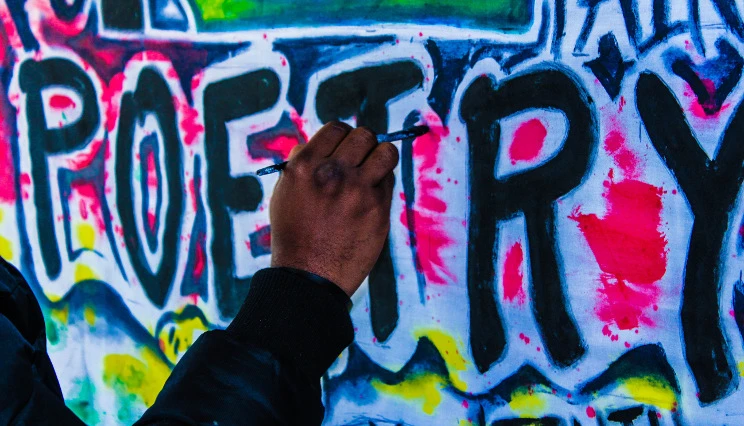Celebrate World Poetry Day 2021
World Poetry Day, celebrated on 21 March, was adopted by UNESCO in 1999 in recognition of the ability of poetry to capture the creative spirit of the human mind. The day aims to encourage poetry in its many forms and languages throughout the world.
Poetry has been a method of self-expression since ancient times. Today, poetry has a vibrant, diverse, and dynamic worldwide community — expressing opinions, telling stories, asking important questions.
We write it, we read it, we perform it, we celebrate it.

Image by Trust "Tru" Katsande. Unsplash. License to use.
Poet Laureates
Poetry was in the public eye around the world in January when 22-year-old Amanda Gorman read her poem The Hill We Climb at US President Joe Biden's inauguration. The lauded poem was published around the world and recordings replayed millions of times. Teaching resources were quickly whipped up, appearing online the very next day. Gorman became the first National Youth Poet Laureate, and her poetry has already been performed and published widely. She will have a poetry collection and a picture book out later this year.
The current US Poetry Foundation Poet Laureate is Naomi Shihab Nye. She is of Palestinian/German/Swiss descent and her experience of cultural difference is evident in her work. Her poetry also reflects her care for the environment and depicts everyday life and 'our own ancestry sifting down to us through small essential daily tasks’. We've several of Nye's books in our Schools Lending Collection, and you can read some of her poetry on the Poetry Foundation website.
New Zealand has its own Poet Laureate. David Eggleton is our current laureate whose poetry is rich with imagery and a sense of place. Have a taster in his poems written for Poetry Day 2020.
Poetry in public
Putting poetry into the public eye has a great impact.
In New Zealand, one of our most public poets (and our laureate from 2017–2019) is Selina Tusitala Marsh. Her graphic memoir Mophead told her personal story of growing up different and her discovery of poetry in a way that young and old could identify with. Mophead took out top honours at the New Zealand Book Awards for Children and Young Adults and at the PANZ Book Design Awards.
Selina's recently published follow-up Mophead Tu tells of Selina’s journey as the Commonwealth Poet, commissioned to write a poem, ‘Unity’, to perform for the Queen in Westminster Abbey. The poem and the process of writing it bring up issues of colonialism, racism, and personal struggle. The place these books now hold in our school and personal libraries brings these issues into a place where they can be discussed and responded to, perhaps with poetry from young readers.
Recordings of these books and other poems online allow us to see poetry in action as well as on the page. It’s also worth watching this Read NZ Writers in Schools video where Selina answers questions from a school, giving insight into how and why she writes.
You'll find Selina’s books — both Mophead titles and her poetry collections — in the National Library Schools Lending Collection, which every school and homeschooler can borrow from. We’ve recently added many other excellent titles to our poetry collection to fit all ages and stages.
You can also download Book and Beyond exemplars for Mophead and Mophead Tu to guide conversations and find ideas for activities based on these titles.
Poetry across the curriculum
For all those kids who're fascinated by building sites and machines, you might read Construction People, which is packed with noisy, action-packed poems.
If animals are your thing, try After Dark: Poems About Nocturnal Animals. There's also Tiger, Tiger Burning Bright! — a big fat, poem-a-day collection, magnificently illustrated by Britta Teckentrup. Or read Leave a Message in the Sand — poems all about animals with hooves!
Poetry fits science, social studies, and pretty much any other area of the curriculum. Our librarians who put together loans for schools are experts at choosing just the right books for your topic. They can include poetry, along with non-fiction and fiction titles, to support your learning area or provide a poetry-specific loan.
Writing poetry
Once you've enjoyed reading some poetry, I highly recommend writing your own. It’s the perfect short form for creative expression, perhaps illustrated too.
Look out for Paula Green’s Poetry Box blog, with the first poetry challenge for years 1 to 8 out soon.
Activism is front and centre in Woke: A Young Poet's Call to Justice, a collection of poetry by women on the theme of social justice, as is Say Her Name, inspired by the campaign of that name. These provide prime examples of speaking out for your cause, for which poetry is a perfect vehicle.
Spoken word poetry
Spoken word poetry is alive and well in New Zealand and providing a platform for people to speak their truth creatively.
Find local events to listen to or perform through the New Zealand Poetry Slam website.
For an Auckland youth event, see Action Education’s WORD – The Front Line competition (put a school team together — entries close 7 May). Even if you can’t enter, have a look at Action Educations’ Facebook page for videos of performances to inspire your own young poets. As their logo says: 'Poetry is Necessary'.
I’d like to echo American poet Jacqueline Woodson (check out her superb verse novels) who hoped that:
...each of you will know — no matter who you are or how you read or where you live — that you have a voice. Use it to write some poems. Use it to change the world.